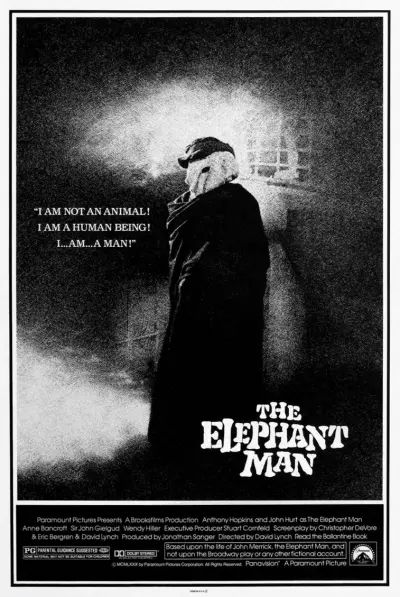
"The Elephant Man" stands out as a profoundly moving classic, touching the deepest emotions of its audience. The film, directed by the exceptionally talented David Lynch, was released in 1980 as a black-and-white masterpiece. It narrates the real-life story of Joseph Merrick—renamed John Merrick in the film—and presents an atmospheric portrayal of Victorian London. John Merrick's existence is far from ordinary; born with severe physical deformities, he is thrust into a life that captures the complete spectrum of human emotion.
John Hurt delivers an extraordinary performance, embodying Merrick with a depth that is both haunting and evocative. Initially, the film presents Merrick as a freak show exhibit, exploited by the greasy showman Bytes, a character given life with remarkable vigor by Freddie Jones. As the storyline progresses, Merrick's circumstances undergo a monumental shift through his encounter with Dr. Frederick Treves, played by the unwaveringly convincing Anthony Hopkins. Treves uncovers the intelligent and sensitive spirit hiding beneath Merrick's outward appearance, steering the film into a tender exploration of the themes of humanity and dignity.
In the narrative's turn, Treves extricates Merrick from Bytes's oppressive grip, providing him refuge at the London Hospital. Here, the film's heartbeat is most palpable, as it sensitively portrays the growth of Merrick's connections with society's elite. This part of Merrick's story is layered with complexity; he finds himself in high society's embrace, treated with a mixture of sympathy and fascination—an engagement that lays bare the core thematic question of the film: What does it mean to be perceived as human?
"The Elephant Man," however, is far from a straightforward tearjerker. Lynch navigates the intricacies of human morality, presenting an array of situations replete with savagery and compassion. The film exposes the audience to raw depictions of inhumanity and exploitation, yet it is interwoven with moments of genuine kindness that penetrate the otherwise overwhelming darkness. It is during such moments that Merrick is accorded the dignity and regard he is due, however fleeting these instances may be.
The stark black-and-white cinematography of "The Elephant Man" is instrumental in emphasizing the film's undercurrents of darkness and light. The haunting imagery—sinister industrial chimneys and oppressive alleyways—serves as a reflection of Merrick's solitude and confinement. Nevertheless, this very starkness enhances the poignancy of the sincere connections he forms. Merrick's journey from objectification to personhood underscores the transformative impact of empathy and recognition.
Ultimately, "The Elephant Man" transcends its period setting to offer profound insights into society's fixation on physical conformity and the intrinsic biases that result. The film meticulously follows Merrick's pursuit of a normal life, from his humble wish to sleep lying down like others to his impassioned declaration, "I am not an animal! I am a human being!" In doing so, it prompts a reevaluation of our collective notions of acceptance and the essence of humanity. Lynch's adaptation is more than just a recounting of Merrick's experiences; it is an enduring mosaic of the human experience that resonates with audiences even to this day.
John Hurt delivers an extraordinary performance, embodying Merrick with a depth that is both haunting and evocative. Initially, the film presents Merrick as a freak show exhibit, exploited by the greasy showman Bytes, a character given life with remarkable vigor by Freddie Jones. As the storyline progresses, Merrick's circumstances undergo a monumental shift through his encounter with Dr. Frederick Treves, played by the unwaveringly convincing Anthony Hopkins. Treves uncovers the intelligent and sensitive spirit hiding beneath Merrick's outward appearance, steering the film into a tender exploration of the themes of humanity and dignity.
In the narrative's turn, Treves extricates Merrick from Bytes's oppressive grip, providing him refuge at the London Hospital. Here, the film's heartbeat is most palpable, as it sensitively portrays the growth of Merrick's connections with society's elite. This part of Merrick's story is layered with complexity; he finds himself in high society's embrace, treated with a mixture of sympathy and fascination—an engagement that lays bare the core thematic question of the film: What does it mean to be perceived as human?
"The Elephant Man," however, is far from a straightforward tearjerker. Lynch navigates the intricacies of human morality, presenting an array of situations replete with savagery and compassion. The film exposes the audience to raw depictions of inhumanity and exploitation, yet it is interwoven with moments of genuine kindness that penetrate the otherwise overwhelming darkness. It is during such moments that Merrick is accorded the dignity and regard he is due, however fleeting these instances may be.
The stark black-and-white cinematography of "The Elephant Man" is instrumental in emphasizing the film's undercurrents of darkness and light. The haunting imagery—sinister industrial chimneys and oppressive alleyways—serves as a reflection of Merrick's solitude and confinement. Nevertheless, this very starkness enhances the poignancy of the sincere connections he forms. Merrick's journey from objectification to personhood underscores the transformative impact of empathy and recognition.
Ultimately, "The Elephant Man" transcends its period setting to offer profound insights into society's fixation on physical conformity and the intrinsic biases that result. The film meticulously follows Merrick's pursuit of a normal life, from his humble wish to sleep lying down like others to his impassioned declaration, "I am not an animal! I am a human being!" In doing so, it prompts a reevaluation of our collective notions of acceptance and the essence of humanity. Lynch's adaptation is more than just a recounting of Merrick's experiences; it is an enduring mosaic of the human experience that resonates with audiences even to this day.

